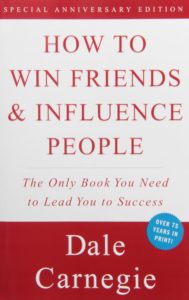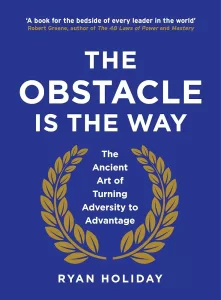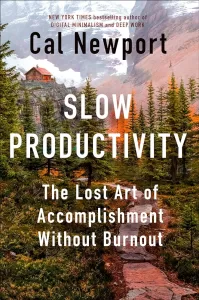Book Review: “How to Win Friends and Influence People”
Book: How to Win Friends and Influence People by Dale Carnegie
Reviewer: Bobby Powers
My Thoughts: 10 of 10
This book deserves a place of prominence on the shelf of every aspiring leader. Carnegie is a master of communication who can teach you how to inspire your co-workers with grace and positive speech. This book completely redefined the way I look at leadership, and Carnegie's writing has had a similar impact on numerous friends of mine as well. You'd be hard-pressed to find a better book on leadership and communication skills.
Takeaways from the Book
Praise > Criticism
- “Criticism is futile because it puts a person on the defensive and usually makes him strive to justify himself. Criticism is dangerous, because it wounds a person’s precious pride, hurts his sense of importance, and arouses resentment.”
- Lincoln “had learned by bitter experience that sharp criticisms and rebukes almost invariably end in futility.”
- “I will speak ill of no man…and speak all the good I know of everybody.” -Benjamin Franklin
- “Instead of condemning people, let’s try to understand them. Let’s try to figure out why they do what they do.”
- “I consider my ability to arouse enthusiasm among my people the greatest asset I possess, and the way to develop the best that is in a person is by appreciation and encouragement. There is nothing else that so kills the ambitions of a person as criticisms from superiors. I never criticize anyone. I believe in giving a person incentive to work. So I am anxious to praise but loath to find fault. If I like anything, I am hearty in my approbation and lavish in my praise.” -Charles Schwab
- “In our interpersonal relations we should never forget that all our associates are human beings and hunger for appreciation. It is the legal tender that all souls enjoy.”
Leading with Influence
- "The only way on earth to influence other people is to talk about what they want and show them how to get it.”
- “Tomorrow you may want to persuade somebody to do something. Before you speak, pause and ask yourself: ‘How can I make this person want to do it?’”
- “When dealing with people, let us remember we are not dealing with creatures of logic. We are dealing with creatures of emotion, creatures bristling with prejudices and motivated by pride and vanity.”
The Power of Listening and Showing Interest in Others
- “If you aspire to be a good conversationalist, be an attentive listener. To be interesting, be interested. Ask questions that other persons will enjoy answering. Encourage them to talk about themselves and their accomplishments.”
- "We are interested in others when they are interested in us.” -Publilius Syrus
- “It is the individual who is not interested in his fellow men who has the greatest difficulties in life and provides the greatest injury to others. It is from among such individuals that all human failures spring.”
- “If there is any one secret of success, it lies in the ability to get the other person’s point of view and see things from that person’s angle as well as from your own.” -Henry Ford
- “You can make more friends in two months by becoming genuinely interested in other people than you can in two years by trying to get other people interested in you.”
- “To know all is to forgive all.”
- “I judge people by their own principles—not by my own.” -Martin Luther King Jr.
- “You deserve very little credit for being what you are—and remember, the people who come to you irritated, bigoted, unreasoning, deserve very little discredit for being what they are.”
Impressive Acts of Leadership
- “Charles Schwab was passing through one of his steel mills one day at noon when he came across some of his employees smoking. Immediately above their heads was a sign that said ‘No Smoking.’ Did Schwab point to the sign and say, ‘Can’t you read?’ Oh, no not Schwab. He walked over to the men, handed each one a cigar, and said, ‘I’ll appreciate it, boys, if you will smoke these on the outside.’ They knew that he knew that they had broken a rule—and they admired him because he said nothing about it and gave them a little present and made them feel important. Couldn’t keep from loving a man like that, could you?”
- “General Robert E. Lee once spoke to the president of the Confederacy, Jefferson Davis, in the most glowing terms about a certain officer under his command. Another officer in attendance was astonished. ‘General,’ he said, ‘do you not know that the man of whom you speak so highly is one of your bitterest enemies who misses no opportunity to malign you?’ ‘Yes,’ replied General Lee, ‘but the president asked my opinion of him; he did not ask for his opinion of me.’”
- “The reason why rivers and seas receive the homage of a hundred mountain streams is that they keep below them. Thus they are able to reign over all the mountain streams. So the sage, wishing to be above men, putteth himself below them; wishing to be before them, he putteth himself behind them. Thus, though his place be above men, they do not feel his weight; though his place be before them, they do not count it an injury.” -Lao-tse
Other Insights
- “Every man I meet is my superior in some way. In that, I learn of him.” -Ralph Waldo Emerson
- "Leadership gravitates to the person who can talk.”
- "When two partners always agree, one of them is not necessary.”
- “About 15 percent of one’s financial success is due to one’s technical knowledge and about 85 percent is due to skill in human engineering—to personality and the ability to lead people.”
- “It is always easier to listen to unpleasant things after we have heard some praise of our good points.”
- “All men have fears, but the brave put down their fears and go forward, sometimes to death, but always to victory.” -Motto of the King’s Guard in Ancient Greece
- “Why prove to a man he is wrong? Is that going to make him like you? Why not let him save his face? He didn’t ask for your opinion. He didn’t want it. Why argue with him? Always avoid the acute angle.”
- “A great man shows his greatness by the way he treats little men.” -Carlyle
- “Asking questions not only makes an order more palatable; it often stimulates the creativity of the persons whom you ask. People are more likely to accept an order if they have had a part in the decision that caused the order to be issued.”
Carnegie's Instructions on How to Lead
- Begin with praise and honest appreciation.
- Call attention to people’s mistakes indirectly.
- Talk about your own mistakes before criticizing the other person.
- Ask questions instead of giving orders.
- Let the other person save face.
- Praise the slightest improvement and praise every improvement.
- Give the other person a fine reputation to live up to.
- Use encouragement. Make the fault seem easy to correct.
- Make the other person happy about doing the thing you suggest.
Think you’d like this book?
Other books you may enjoy:
- Crucial Conversations from Kerry Patterson, Joseph Grenny, Ron McMillan, and Al Switzler
- Thanks for the Feedback by Douglas Stone and Sheila Heen
Other notable books by the author:
- The Art of Public Speaking
- How to Stop Worrying and Start Living
Want to become a stronger leader?
Sign up to get my exclusive
10-page guide for leaders and learners.






